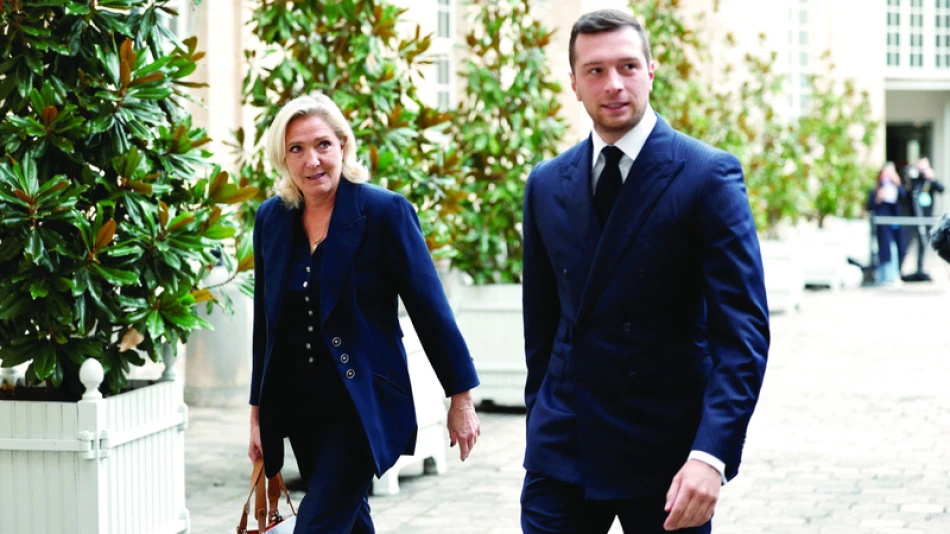
Marine Le Pen's Far-Right Party Poised to Seize Power in France's Pivotal Election
Le Pen's Political Gamble: Why France's Far-Right Leader Chose Crisis Over Compromise
Marine Le Pen's decision to topple French Prime Minister François Bayrou represents a calculated bet on political chaos over incremental gains. Despite facing an electoral ban that could sideline her from the 2027 presidential race, the National Rally leader has chosen to accelerate France's constitutional crisis, gambling that public frustration will eventually sweep her party to power.
The Miscalculation That Shook the Élysée
Bayrou and President Emmanuel Macron fundamentally misjudged Le Pen's strategic priorities when they called for a confidence vote on September 8th. Their logic seemed sound: why would a politician barred from running for office risk triggering elections that could cost her parliamentary seat? Why wouldn't she prefer to let Macron's camp shoulder responsibility for the painful €43.8 billion budget cuts?
The answer came within an hour of the confidence vote announcement. Le Pen pledged to mobilize her forces to bring down Bayrou, declaring on social media platform X that "only the dissolution of the government will allow the French people to choose their destiny, which is recovery with the National Rally."
A Strategy Born from Desperation or Confidence?
Le Pen's embezzlement conviction, which bars her from seeking elected office pending appeal next year, might have been expected to moderate her approach. Instead, it appears to have liberated her from conventional political calculations. National Rally deputy Laurent Jacobelli dismissed suggestions that his party leader would compromise, stating that critics "misunderstand Marine Le Pen, who is not like them."
The Collapse of Centrist France
Bayrou's admission that he failed to test Le Pen's position before calling the vote reveals the growing disconnect between France's centrist establishment and its opposition. His explanation that opposition leaders were "on vacation" drew mockery from Le Pen, who noted she had continued working throughout the summer.
With left-wing parties immediately announcing their intention to vote against Bayrou, the government's fate now hangs by a thread. A scheduled meeting between Le Pen, her deputy Jordan Bardella, and Bayrou this week appears unlikely to produce a compromise, given the National Rally's hardened stance.
Limited Options for Macron
Should Bayrou fall, Macron faces a shrinking pool of viable successors. Speculation centers on Armed Forces Minister Sébastien Lecornu, but the National Rally and other opposition voices argue that successive center-right politicians have failed to resolve the prolonged crisis stemming from Macron's disastrous decision to call early elections last year.
Public Opinion and Electoral Mathematics
An Ifop poll conducted after Bayrou's speech revealed that 63% of respondents support returning to the ballot box, rising to 86% among National Rally voters. However, polling also suggests new elections could produce another hung parliament, leaving France trapped in the same institutional deadlock.
This uncertainty may explain Macron's reluctance to call fresh elections. His surprise vote last year created the current political paralysis and left deep scars within his own camp.
The Bardella Factor: Youth Meets Experience
Jordan Bardella, the 29-year-old telegenic deputy leader, has repeatedly called for Macron's resignation, likely with Le Pen's approval. Despite his mentor's legal troubles, Bardella continues to dominate the party's communication strategy, which has improved since initial missteps following the court ruling.
One theory suggests Le Pen has accepted she may not run for president in the near future and is considering a role as Prime Minister if Bardella successfully campaigns for the Élysée Palace. Party spokesman Jacobelli vehemently denied this, insisting "Marine Le Pen never gives up. She cannot accept that the opposition leader cannot run for election."
Legal Maneuvers and Constitutional Challenges
Le Pen's team has been exploring every available legal avenue since spring, consulting numerous lawyers and legal experts. Her senior aides are researching ways to challenge the constitutionality of her electoral ban before France's Constitutional Court.
Bardella confirmed this approach, telling TF1: "Clearly, we are exploring all legal avenues so that Marine Le Pen can run even in the event of dissolution. There is a legal path, and although it is narrow, Marine Le Pen is fighting for it."
A Partnership Built for Power
The French court's ban on Le Pen running for president in 2027 raises questions about future National Rally leadership dynamics. Whether Le Pen serves as president with Bardella as prime minister, or vice versa, their different motivations and priorities appear perfectly aligned.
Le Pen's more Gaullist and economically populist approach only succeeds if it can be made financially sustainable. Bardella would add necessary economic realism to French governance, recognizing that without growth, private investment, and credible debt reduction plans, the state cannot protect anyone.
The Promise of Renewal
The French right now possesses both a veteran figure who reassures voters (Le Pen) and a young reformer who promises change (Bardella). This combination could prove key to addressing France's chronic problems: rising debt, weak competitiveness, sluggish growth, and tragic talent flight that have remained unchecked.
France has reinvented itself before. If Macron exits the political stage and the National Rally takes control, it might do so again—this time with a unique blend of Le Pen's economic nationalism and Bardella's more market-friendly program. At minimum, it would have a new government with a clear democratic mandate and sufficient political capital for transformation.
Change is exactly what France urgently needs, and Le Pen appears willing to risk everything to deliver it.
Most Viewed News

 Sara Khaled
Sara Khaled






